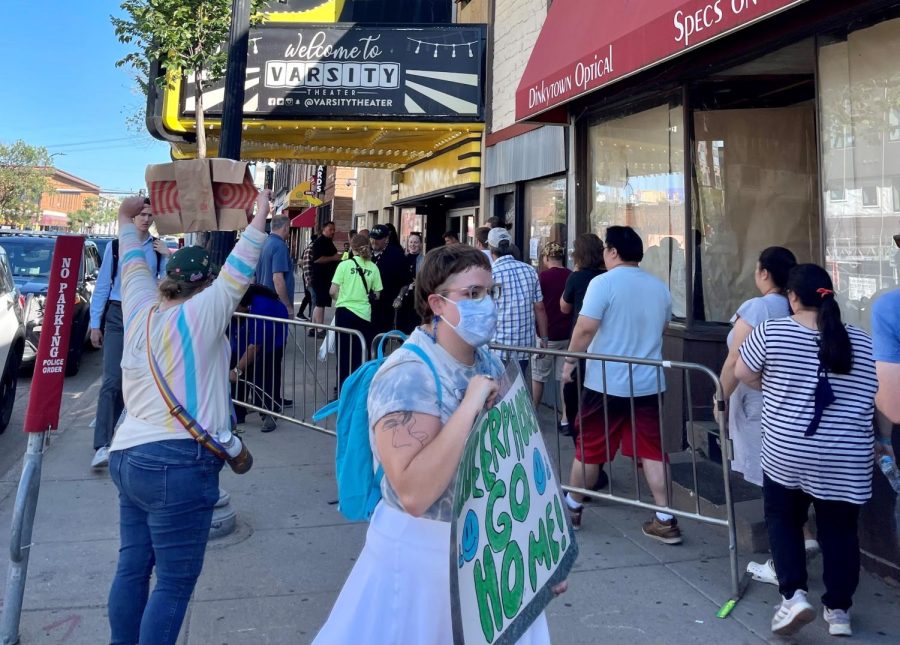Dave Chappelle’s stand-up shows at Varsity Theater inflamed tensions between his fans and transgender rights protesters on Wednesday, Thursday and Friday nights amid controversy over the comedian’s comments about transgender people.
First Avenue was originally supposed to host the comedian but canceled just hours before showtime due to backlash from the venue’s workers, community members and LGBTQ+ activists who have accused Chappelle of transphobia following a pattern of comments, most recently in his 2021 Netflix special, “The Closer.”
“To staff, artists and our community, we hear you and we are sorry. We know we must hold ourselves to the highest standards, and we know we let you down,” part of First Ave’s cancellation post read. “We believe in diverse voices and the freedom of artistic expression, but in honoring that, we lost sight of the impact this would have.”
Dinkytown’s Varsity Theater picked up Chappelle’s show and added two extra dates to his stop in Minneapolis, making a total of six performances (two per day).
The cancellation news gained the attention of local, national and international publications alike, bringing the world’s heated discussion of transgender inclusion to Dinkytown. For three days, transgender rights protestors gathered outside of Varsity as fans lined up for each show.
Prior to publication, Varsity Theater had not responded to the Minnesota Daily’s requests for a comment.
“I will say the same things about Varsity Theater that I said to the folks at First Ave. We’re disappointed that they’re hosting Dave Chappelle,” Kat Rohn, executive director of the LGBTQ+ rights advocacy group OutFront Minnesota, said. “We feel strongly that platforming the sort of potentially transphobic rhetoric that has popped up through a number of Dave Chappelle specials will cause harm for our community.”
Fans waiting in line for Chappelle on Thursday did not express a similar concern and said Chappelle’s boundary-pushing comedy targets all groups equally.
“He jokes about everybody. I understand that some people are more sensitive than others, but it doesn’t bother me,” Chappelle fan Mel Melchizedek said.
The protestors that gathered in front of Varsity Theater argued that transgender people are particularly vulnerable to hate speech and hate crimes.
More than a third of transgender or nonbinary youth reported incidents of physical harm or threats on the basis of their gender identity this year, according to a 2022 national survey by the Trevor Project. LBGTQ+ youth are also significantly more likely to consider or commit suicide than their straight and cisgender peers, according to a study published by the CDC in 2019.
“A lot of it is a joke and a lot of it doesn’t come from a place of anger where you think it’s a hate crime-y kind of thing,” Chappelle fan Nicole Caine said on Thursday.
Chappelle made his name as a comedian in the early ‘00s for stirring controversy and pushing the boundaries of America’s conversations on race, politics and identity. Like Ricky Gervais and many other comedians of his generation, Chappelle’s comments have begun to attract more fervently negative attention from social activists in recent years.
At a time when reported anti-trans violence has reached a record high and legislators across the country have begun to advocate to roll back LGBTQ+ rights, protesters said Chappelle’s comments felt especially dangerous. .
“LGBTQ youth, particularly trans and gender-diverse youth, are impacted by an overall climate of transphobia,” Rohn said while explaining the negative effect comedians can have when they normalize transphobic language.
“I’m Team TERF. I agree. I agree, man. Gender is a fact,” Chappelle said in his most recent special, “The Closer,” weighing in on a previous J.K. Rowling controversy. TERF, meaning trans-exclusionary radical feminist, is a term that describes a group who argue transgender women do not qualify as women and therefore should not share the same rights.
Despite stark disagreements over the content of Chappelle’s performance, both protestors and fans alike expressed skepticism about First Ave’s decision to move the show. The sentiment expressed on both sides may signal a stain on Minneapolis’ most famous venue’s reputation.
“They had already decided to book him and everything, canceling at the last minute doesn’t really seem like they mean anything that they were saying,” Robert Johnson said while waiting in line for the show. “It just seems like they switched last minute because of the flack they were getting.”
Lydia, a protester who did not want to give their full name for privacy reasons, also said she was disappointed with First Ave.
“It sounds like they’re being complicit and they just canceled it because of public outcry,” Lydia said. “Not because they actually care.”



















